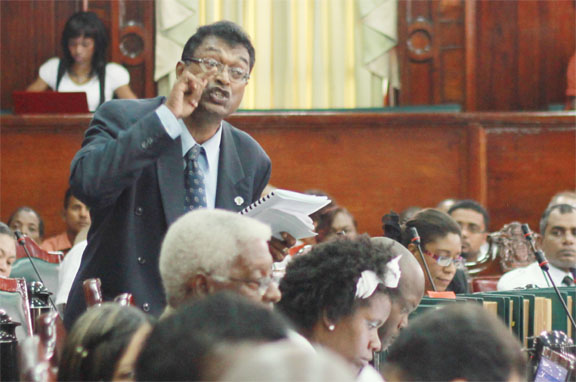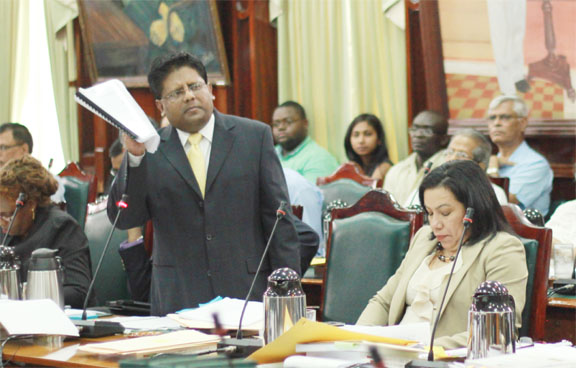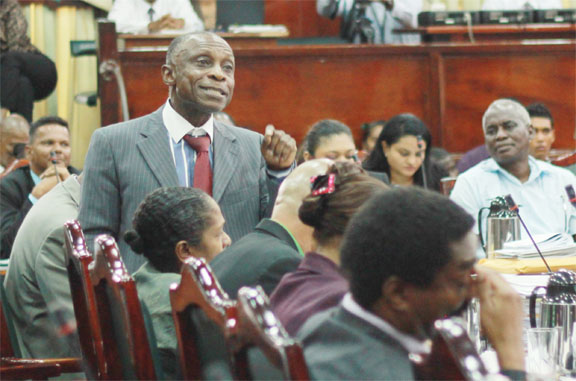AFC Leader and MP Khemraj Ramjattan yesterday expressed surprise at government’s refusal to accept the opposition’s right to amend the budget in the light of promises by Finance Minister Dr Ashni Singh during the last budget debates to defend those very rights, but Singh said those remarks were made in an “unprecedented atmosphere”.
Government and AFC MPs yesterday faced off in the National Assembly over whether the proposed budget cuts would be allowed after Speaker of the House Raphael Trotman, in an unprecedented move, decided that the proposal’s legality would be considered before the Committee of Supply scrutinised the estimates.
The combined opposition had last week voted to defer the consideration of the estimates to yesterday. When the process got underway, the House was expected to start the consideration of estimates for the ministries of Foreign Affairs, Legal Affairs, Agriculture and Education.
Instead, Trotman said he thought it best that the House determine the legitimacy of the cuts before the consideration of the estimates so that the latter process could be smoother.
Considering the suddenness of the decision, Trotman solicited the position of the House and asked whether they would need time to put together their respective arguments.
The decision was not opposed and Trotman called upon Ramjattan to begin the proceedings by explaining why his party’s proposal for cuts to the 2013 budget should be entertained. But Ramjattan said he felt it proper that the government open the deliberations to justify its rejection of the proposal.

yesterday. (Photo by Arian Browne)
Trotman insisted that Ramjattan commence the deliberations so as to provide a clear indication of why his party felt the cuts were legitimate and should be considered by the house.
However, PPP/C MP and Attorney General Anil Nandlall rose to argue that Acting Chief Justice Ian Chang, in his judgment on last year’s budget cuts, had already established that that the opposition lacked the legitimacy to request any cuts to the estimates proposed by government.
But the Speaker interjected that the decision made by the court “does not interrupt what is done in Parliament,” and said that the motions would be entertained.
Opening his arguments, Ramjattan said the National Assembly’s constitutional privilege to propose amendments to the budget is what enables it to effectively scrutinise and supervise public finances. Ramjattan said that according to Article 218 of Guyana’s Constitution, the Minister of Finance cannot receive any money to cover the government’s proposed 2013 expenditure unless it is approved by the National Assembly, of which the opposition parties are a part. This, he said, clearly puts the ability to impact the budget, which is a bill like any other, within the purview of Parliament.
More specifically, he said Article 171 (2) testifies to the jurisdiction given to the opposition to make reductions to the budget, while making it clear that only the Finance Minister can suggest increases.
The article reads: “Except on the recommendation or with the consent of the Cabinet signified by a Minister, the Assembly shall not proceed upon any motion (including any amendment to a motion) the effect of which, in the opinion of the person presiding, would be to make provision for any of the purposes aforesaid.”
Ramjattan said a motion to make reductions in the proposed budget can be brought to the House to be considered by the Committee of Supply which has the ability to make reductions. This, in keeping with Article 76 (4) of the Standing Orders he said, can be done as long as sufficient notice of the motion is submitted.
Ramjattan chastised the government over its apparent conviction that the legislative arm only has the ability to approve or disapprove requests for public expenditure made by government and said that any conception that the National Assembly can only approve or refuse the budget is flawed.
APNU MP Carl Greenidge stated that if the proposal to amend the budget was not allowed it would amount to stripping the legislature of its ability to stop illegal or improper requests from being made. “If the legislature cannot amend we might as well go home,” said Greenidge.
He said the power to make these cuts when necessary have long been exercised in similar legislative bodies.

Singh dismissed Ramjattan’s interpretation of the constitutional provision on this issue, also pointing to Justice Chang’s ruling, which stated: “In summary, the court finds that the act of the National Assembly in cutting or reducing the estimates of expenditure laid by the Minister of Finance under Article 218 of the Constitution was outside its constitutional remit.”
Singh said that while the Constitution makes provisions for the National Assembly to refuse the approval of the budget, there are no provisions as to what should be done if the estimates are not approved since it was drafted with the assumption that the estimates would eventually be adopted by the House. The minister quoted Justice Chang’s decision extensively in order to make his point that the assertion by the party that it possessed the constitutional right to make amendments to the budget was misguided.
“The motion for the amendment submitted by the honorable member [Ramjattan] should not be entertained,” Singh said and was then roundly criticised by members of the opposition for “selectively quoting Justice Chang’s decision.”
Justice Chang had also determined that “the Appropriation Bill passed by Parliament and which includes the budget cuts and was assented to by President Donald Ramotar was in fact constitutional.” This, according to members of the opposition, signified the legislature’s ability to make the proposed cuts.
PPP/C MP and Chief Whip Gail Teixeira, reinforcing Singh’s arguments, said the decision of Justice Chang ought to be taken seriously. She said “the Chief Justice has ruled that the Constitution does not give the opposition the power to make cuts,” and called for the judgment to be respected. She said that according to the ruling, amendments to the budget cannot be made by the opposition unless the Constitution itself is amended.
Ramjattan expressed surprise at the Finance Minister for opposing the amendments, especially since he had recognised and promised to defend the opposition’s right to exercise that provision.
Quoting Singh from Guyana’s Hansard, Ramjattan pointed out the fact that Singh admitted to the right of the opposition to make amendments, and had even pledged that “we in the PPP/C would always defend that right.” Ramjattan questioned why, considering the statements he made on behalf of himself and his party, the minister would now try to take away that which he promised to uphold.
Singh replied that he had made the statements in an “unprecedented atmosphere”. The minister said, “Considering we were in uncharted waters whatever words may have been uttered were done so without the benefit of collective expertise of confronting challenging situations and putting them to the test.”
As such, he said, what was said during last year’s debates should not be seen in any way as a shifting of government’s position on the matter.
Ramjattan, relentless in his bid to prove the legitimacy of the National Assembly to make the proposed cuts, said that Article 71 (5) of the Standing Orders, which reads “the motion for the approval of the Estimates shall be amended if necessary, and put, without further debate, as moved or as amended, as the case may be,” also speaks to the power given to the legislature to make any amendment it sees fit.

He further cited Article 74 (4), which reads “an amendment to any head of expenditure to reduce the sum allotted thereto in respect of any item therein may be moved by any member, and shall take the form of a motion.”
Ramjattan said, “I am not a minister but I am a member and I am asking that the amendments be considered.”
Teixeira, in response, said that when the Constitution had been amended there were a few sections that had not been amended since it was not perceived that they would be used to propose budgetary cuts.
Ramjattan cautioned the assembly against removing this privilege from the legislature. He warned, “To take away this power from Parliament is to take away its ability to ensure the state’s public funds are spent responsibly.”
In the end, however, he said that whether or not the cuts were made ultimately relied on how satisfactorily the government answered questions relating to its requests for funds.




